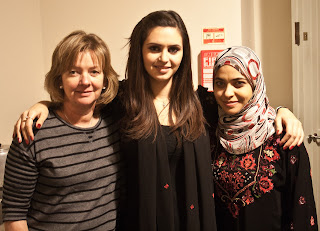 |
| Schmitt and Haddad presenting at the event |
Friday 10th
May saw a presentation by the authors of ‘The Gaza Kitchen’,
Laila El-Haddad and Maggie Schmitt, and a live cooking demonstration in
Islington.
El-Haddad and Schmitt met ‘virtually’ in 2009, with a vision to travel to Gaza and collate the recipes of the people of Gaza. The product of their travels was ‘The Gaza Kitchen’. As stated in the book's forward by Nancy Harmon Jenkins, the aim is not just to serve as a recipe book to showcase Gazan cuisine, but is 'a significant look at the people of this tiny corner of the world.'
According to Schmitt,
there are four narrative strands to the book:
1)
Gazan
cooking has never been documented, written down or acknowledged, something
which the authors felt was important.
2)
They
wanted to give a human face to Gaza by telling the human stories and personal
histories of ordinary families in Gaza.
3)
The book
addresses the agricultural and economical situation in Gaza, the lack of water
supply, the tunnel system and the politics which all dictate what is available
to cook and eat in Gaza.
4)
The book
includes beautiful photography which captures daily life and the people of
Gaza, as well as bringing to life some of the delicious dishes in the book.
Schmitt and El-Haddad highlighted in their presentation numerous examples of the extreme hardships that Gazans have to overcome in their everyday lives, and the impact that has on their cuisine, diets and the food industry in the Gaza Strip.
Gaza is one of the
most densely populated places in the world. Despite this, farming still takes
place, with farmers risking life and limb to work the land in the buffer
‘no-go’ zone which encircles the border between Israel and the Gaza Strip.
Farmers who have had
their olive and date trees razed face a 20 year wait for newly planted trees to
start yielding fruit. This can put their families under great economical
hardship in the meantime.
Despite being the last
part of historical Palestine with access to the sea, Gazan fisherman are only
permitted to go out 3 nautical miles into the sea to fish.
There are 8 to 10 hour
blocks of power outages, and 80% of people in Gaza are dependent on food
handouts from organisations like UNRWA.
Israel has made a
radical, abrupt and intentional impoverishment of Gaza, allowing just enough
food in to prevent internationally acknowledged humanitarian crisis but not
enough for people to thrive or function properly. The decisions made about what
is permitted to cross the border seem arbitrary; one week a particular
foodstuff may not be permitted and then the next (particularly when Israel
wants to dump a surplus of, say, cucumbers) it will come through in large
quantities. This makes it impossible for Gazan farmers to forecast the market,
who might find that their harvest is devalued when an influx of cheap produce
comes through from Israel.
Nutritionists have
highlighted that with each peak in violence (bombings, incursions etc) in Gaza
the level of child malnutrition also peaks accordingly, as their families become
more dependent on food aid with little nutritional value.
After 1948 the population in the Gaza strip tripled overnight. 80% of refugees came from towns and villages outside of Gaza, each with their own unique culinary heritage. Even after their hometowns had been wiped off the map with the creation of the state of Israel, they ensured they lived on through the recipes which they brought with them to Gaza. This meant that you could literally ‘taste’ the town or village from which they originally hailed.
El-Haddad argues that
food is the “last sanctuary which Palestinians still have control over” even
when they have lost control over all other aspects of their lives; their
freedom, possessions, etc. They view the book not
only as something which champions the unique and rich cuisine of Gaza, but as a
‘Trojan Horse’ – in essence a point of entry for opening up dialogue in the
West about the political and humanitarian situation in Gaza.
‘The Gaza Kitchen’ carries the message
that in the face of unimaginable adversity on so many levels, the tenacity and
humanity of the Gazan people reigns.
Response to the book
in the USA has been unexpectedly and overwhelmingly positive. El-Haddad claims
that staunch Zionists have read the book and admitted it was “eye-opening”. The
Washington Post published an article by a Liberal Zionist on ‘Israeli Ma’loubeh’
on Nakba Day – they included a quote by El-Haddad who explained how doing this
was deeply offensive. For a US audience, it is difficult to discuss Palestine,
even to mention the word ‘Palestine’, so for a national newspaper to talk about
the Nakba and give a Palestinian viewpoint demonstrates, in the view of the
authors, the shift in the Western world, where dialogue is becoming more open.
 |
| Tasty result of the live demo - two versions of Dagga salad |
At the end of the
presentation, people were able to purchase copies of ‘The Gaza Kitchen’ which
the authors were signing. There was also a live demonstration of how to make the Gazan salad ‘Dagga’,
which means ‘crush / mash’, with audience volunteers (myself included!)
Dagga is a hot salad made with green chilli peppers, garlic, salt, ripe
tomatoes, and the key ingredient of dill seed or fresh dill in large
quantities. The ingredients are all mashed together in a zibdiya (pestle and
mortar), and doused in a healthy glug of olive oil to cut through the heat of
the chillies, and then eaten with khoubez (Arabic bread).
 |
| Getting involved in the live demo! |
 |
| "Gaza has a unique, delicious and marvellous cuisine" - Maggie Schmitt |
‘The Gaza Kitchen’ is
on sale now – you can buy it here.
Leila
x



























